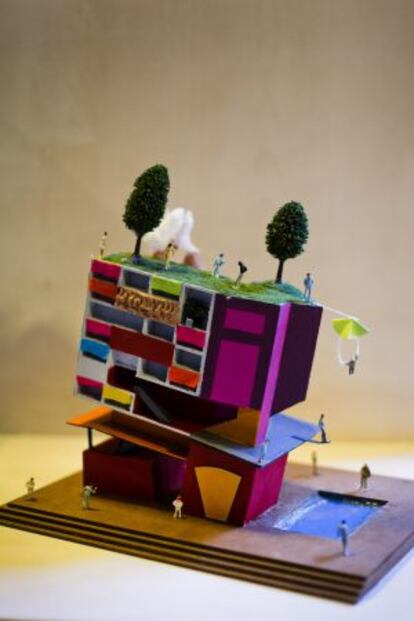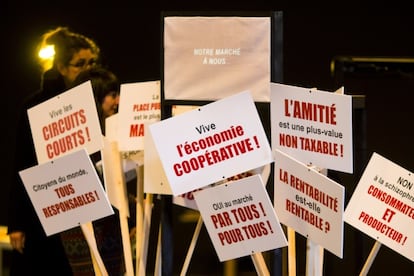Your city needs you!
Madrid exhibition ‘We Traders’ is encouraging people to protest a bit less and act a bit more The show highlights 25 civic initiatives from five European countries

“Almost anything can happen here. Without the ‘almost,’ it would be utopia.” The popular initiative Campo de la Cebada (Barley Field) grew out of the demolition of an old sports center in La Latina; the resulting empty lot soon became a customized space for local cultural activities. “We are residents who want to encourage the temporary use of this space,” the collective explains.
Now, this “playing field” has become part of We Traders, an exhibition showcasing 25 citizen initiatives in five different cities, on display at Matadero de Madrid until March 16.
All of the ideas in the show share a common idea: that the economic recession provides an opportunity for people to improve their cities at the community level.
The five cities in question are Madrid, Berlin, Lisbon, Turin and Toulouse, which share “the role played by citizens in them,” says Angelika Fitz, a specialist in urban design and architecture who has co-curated the Matadero show with Rose Epple, a design expert. To them, the financial crisis, the strapped budgets, the social polarization, the housing problems and the loss of public space are all triggering different reactions from citizens.
“Protesting is one form of showing your discontent; taking action is another,” claims Fitz. “When these people start to get involved with their local communities, their cities or their regions, they become we traders,” says Epple. “But they trade in knowledge, not in goods.”
Lately, many collectives are working in this same direction, so after defining the role of the we traders, the show organizers have sought out the five most representative ideas from each location. A group of local curators assisted them in this project.
Swapping the crisis for community
Five. That is how many cities are participating in the project: Madrid, Berlin, Lisbon, Turin and Toulouse.
Utopia. Five initiatives feature from each city: a total of 25 projects. Representing Madrid are Campo de la Cebada, Vivero de Iniciativas Populares (VIC), Walkinn Coop, Gabinete de Crisis de Ficciones Políticas and Todo por la Praxis.
Workshops. Various activities will bring the philosophy behind the projects closer to visitors.
Traveling show. After Madrid, We Traders will move on to the four other cities to inspire social change there.
#wetraders. All the related opinions under this Twitter hashtag will be screened during the exhibition.
Web. Visit www.goethe.de/ins/be/prj/wet/esindex.htm for more information.
Despite the analogies, each city has been experiencing the crisis in a different way, and has associated problems that derive from local idiosyncrasies. Imbued by their goal of changing local realities, the we traders identified specific weaknesses in need of attention: in Lisbon, what’s required is social and urban intervention; Turin needs to work on common areas; Berlin needs to prevent a specific neighborhood from turning into a ghetto; and Toulouse has to work on its shortage of social housing.
So what about Madrid?
“We found a problem with all the empty spaces, from apartments and vacant lots to some squares that underwent a remodeling and became transit areas where nobody stops any more,” explains Duero.
After identifying the most pressing problems in each city, the time came to find ideas to change those realities. This task began last summer, and involved over 200 people.
Besides the Campo de la Cebada, other Madrid initiatives that made it into the exhibition include Todo por la Praxis; VIC (Vivero de Iniciativas Ciudadanas); Walkinn Coop and Gabinete de Crisis de Ficciones Políticas.
“All the proposals had to be easy to replicate and take down,” note the artistic directors. Easy to replicate so that other cities might find inspiration in them, and easy to take down so they can be taken to the other cities that are part of this traveling exhibition, which is being sponsored by the Goethe Institut.
What all the projects have in common is a combination of art, architecture, ecology, cooperation and action. “The economic problems that began over six years ago have led to a significant moral crisis, and often to despair,” says Fitz. “This show aims to encourage people to have a proactive attitude, because when the markets fail, citizens can develop new forms of exchange.”
For instance, the Berlin project Initiative Möckernkiez began as a way to deal with the problem of “neoliberal urban development and the privatization of public spaces.” Their struggle began with the acquisition of a 30,000-square-meter lot in the neighborhood of Gleisdreieck, with the goal of building a community estate of environmentally friendly homes with no architectural barriers that would encourage cultural and social integration. Project leaders want to hand over the first keys late this year.
“I think that the concept of the exhibition serves to connect the various proposals in a specific space that we have defined as the marketplace,” says Íñigo Cornago, an architect who, together with his colleague Claudia Sánchez, has come up with Cocook, a collaborative cooking project in public city spaces. It comprises a traveling kitchen that shows up on any given street, square or garden, and encourages people to boil, fry or roast collectively.

“As far as encouraging cultural exchanges goes, the internet affords amazing opportunities because it amplifies the message: any event occurring in a given place has a parallel online audience with a lot of potential,” adds Cornago.
Organizers agree that the internet plays a pivotal role in changing citizens’ attitudes. “The do-it-yourself culture is very representative of our times,” says Fitz. “On the one hand, the internet has favored the exchange of information and transparency. On the other, the social networks have encouraged us to participate virtually. Now the time has come to make it real.”
To provide an online outlet for all the knowledge that has come together in We Traders, organizers have created a Twitter hashtag, #wetraders. All the messages published with this tag will be screened during the exhibition in Madrid.
Five cities, 25 projects and a huge desire to act and change things; that could be the line that sums up the entire project. Campo de la Cebada has just announced a new achievement: raising enough funds to build a geodesic dome that will house cultural activities. It is but one way to change the world from the bottom up.
We Traders. Until March 16 at Matadero de Madrid, Nave 16, Paseo de la Chopera 14, Madrid. www.mataderomadrid.org
Tu suscripción se está usando en otro dispositivo
¿Quieres añadir otro usuario a tu suscripción?
Si continúas leyendo en este dispositivo, no se podrá leer en el otro.
FlechaTu suscripción se está usando en otro dispositivo y solo puedes acceder a EL PAÍS desde un dispositivo a la vez.
Si quieres compartir tu cuenta, cambia tu suscripción a la modalidad Premium, así podrás añadir otro usuario. Cada uno accederá con su propia cuenta de email, lo que os permitirá personalizar vuestra experiencia en EL PAÍS.
¿Tienes una suscripción de empresa? Accede aquí para contratar más cuentas.
En el caso de no saber quién está usando tu cuenta, te recomendamos cambiar tu contraseña aquí.
Si decides continuar compartiendo tu cuenta, este mensaje se mostrará en tu dispositivo y en el de la otra persona que está usando tu cuenta de forma indefinida, afectando a tu experiencia de lectura. Puedes consultar aquí los términos y condiciones de la suscripción digital.









































